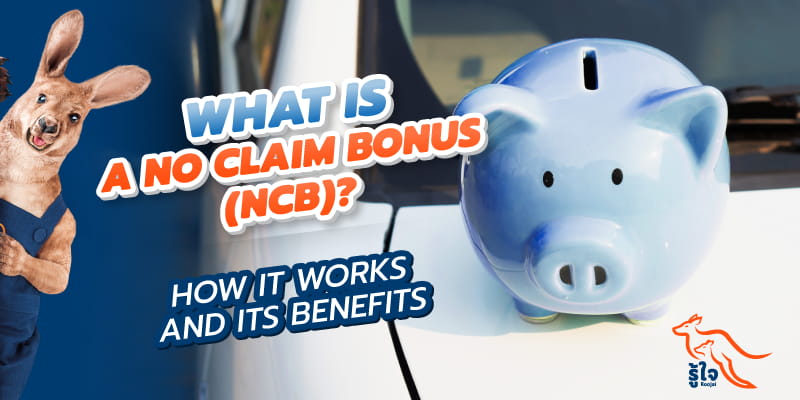What does no claims bonus mean?
A no claims bonus (NCB), also known as a no claims discount, is a reward given by insurance companies to policyholders who do not make any claims during their insurance period. This bonus accumulates over time and can significantly reduce your car insurance premium up to 50%. Essentially, it serves as an incentive for safe driving and careful vehicle maintenance.

Is no claims discount the same thing as no claims bonus?
While the terms may differ, the underlying principle remains the same—both are used to describe the reduction in premiums as a result of not making any claims.
How does no claims bonus work?
For each year you don’t make a claim, you earn a discount on your car insurance premium. The more consecutive claim-free years you have, the higher the discount. The NCB usually applies to your car insurance policy's ‘Own Damage’ component, which covers damages to your own vehicle.
How is no claims bonus calculated?
The no claims bonus is calculated based on the number of consecutive years you have not claimed on your car insurance. Here’s a breakdown of how it typically works:
- 20% discount on premium renewal after 1 claim-free year.
- 30% discount on premium renewal after 2 claim-free years.
- 40% discount on premium renewal after 3 claim-free years.
- 50% discount on premium renewal after 4 claim-free years.
For example, if you’ve maintained a clean driving record without accidents or claims, you could qualify for up to a 50% discount on your car insurance premium in the fifth year. This substantial discount rewards safe driving and can significantly lower your insurance costs.
What are the benefits of no claims discounts?
- Cost savings: One of the primary benefits of NCB is the reduction in your car insurance premiums. This can result in substantial savings, especially if you maintain a no claims record for several years.
- Encourages safe driving: NCB incentivises careful driving and adherence to traffic laws, as making a claim can reduce or eliminate your bonus.
- Long-term rewards: The longer you go without making a claim, the greater your discount. This long-term benefit encourages policyholders to drive safely and avoid accidents.

Can no claims bonus be transferred to another insurer?
No claims discounts can often be transferred if you switch insurers. This means you won’t lose your earned discount when you decide to change your insurance provider. However, it’s important to check with your new insurer about their specific policies regarding NCB transfer.
Can no claims bonus be transferred to another car?
No claims bonus is tied to the policyholder and not the vehicle. This means that if you sell your current car and purchase a new one, you can transfer your NCB to the insurance policy for the new vehicle. The NCB remains with you as the policyholder, allowing you to continue benefiting from the discount you have accumulated over the years. Make sure to inform your insurer about the change and provide any necessary documentation to ensure the transfer is processed smoothly.
How can you find your no claims bonus?
To get proof of your no claims bonus, you can start by checking your car insurance renewal documents, as these often include details about your NCB. If you have recently switched insurers, you can still use your policy document from the previous insurer to transfer your NCB.
Another option is to directly contact your current or previous insurer and request a letter or certificate confirming your NCB. Many insurers provide access to policy documents through their online portals, so you can log in to your account and download the necessary proof. Additionally, if you purchased your policy through an insurance broker, they can assist in obtaining proof of your NCB.
How long does no claims discount last?
The no claims discount typically remains valid for up to six months if you don’t have an active car insurance policy. This means that if you stop driving or don’t renew your insurance for more than six months, you may lose your accumulated NCB and have to start building it up again from scratch.
What happens to the no claims bonus if you make a claim?
If you are not at fault in an accident, you can file a claim without affecting your accumulated NCB, as you were not driving negligently or causing the accident. However, if you are at fault or cannot identify the other party, filing a claim may result in losing some of your no claims bonus.
For example, if your NCB is 30% and you report a claim where you are at fault or there is no third-party involved, your NCB will decrease to 20% the following year. Additionally, if you report more than 2 claims where you are at fault or there is no third-party involved, and the total claim amount exceeds 200% of the premium, your NCB will decrease by 2 steps. This means at renewal, your NCB will be 0%.
Tips to build up your no claims bonus
To build up your NCB, you need to maintain a record of not making any claims on your car insurance over consecutive years. Here are some tips:
- Avoid claims: The key to accumulating NCB is to avoid making any insurance claims. Each year you don’t file a claim, you earn another year of NCB.
- Renew on time: Make sure to renew your insurance policy on time every year. Gaps in coverage may cause you to lose your NCB.
- Safe driving: Practice safe driving habits to reduce the risk of accidents and the need to make claims.
- Choose higher deductibles: Opting for a higher deductible can lower your premium and discourage making small claims, helping you maintain your NCB.
- Transfer your NCB: If you change insurance providers, ensure you transfer your NCB by providing proof of your claim-free years to the new insurer.
Definitions
| Coverage | The scope of protection provided by an insurance company, including what events or damages are covered. |
| Deductible | The portion of a claim you agree to pay out-of-pocket before the insurance company covers the rest. Also known as excess. |
| Insurance Broker | A person or firm that sells, solicits, or negotiates insurance policies on behalf of clients for compensation. Brokers typically earn a commission from the insurance company when they sell a policy. |
| Policyholder | A policyholder is the individual or entity that owns an insurance policy and is responsible for maintaining it by paying premiums. |
| Renewal | The process of extending your insurance policy for another term, usually a year. |
